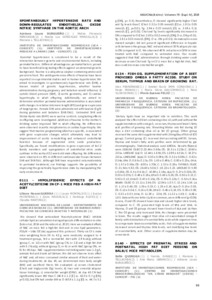Por favor, use este identificador para citar o enlazar este ítem:
https://repositorio.uca.edu.ar/handle/123456789/14320| Título: | Effects of prenatal stress and postnatal high fat diet feeding on BALB/c mice metabolism | Autor: | Quiroga, Sofia Juárez, Yamila R. Tellechea, Mariana L. Genaro, Ana María Burgueño, Adriana Laura |
Palabras clave: | ESTRES PRENATAL | Fecha de publicación: | 2019 | Editorial: | Fundación Revista Medicina | Cita: | Quiroga, S., et al. Effects of prenatal stress and postnatal high fat diet feeding on BALB/c mice metabolism [en línea]. Medicina Buenos Aires. 2019, 79 (Supl. IV) Disponible en: https://repositorio.uca.edu.ar/handle/123456789/14320 | Resumen: | Resumen: In-utero exposure to maternal stress increases short and long term risk of suffering metabolic diseases. Exposure to stressful events leads to an increase in glucocorticoids release by activation of the HPA axis, therefore early programming of the HPA axis has emerged as a key underlying mechanism of stress-related disorders. Evidence suggests that a stressful prenatal environment seems to favour adverse metabolic conditions. To test this hypothesis in BALB/c mice, a strain susceptible to stress but resistant to metabolic effects of a high fat diet (HFD), we exposed female pregnant mice to restraint stress during the last week of pregnancy (2 h/day). Offspring were fed with HFD between weeks 4 and 28 of age. Prenatally stressed (PS) females and males fed with HFD showed higher body weight (females: p<0.001, n= 8; males: p<0.01, n= 8) and adipose tissue content (adipose tissue weight/body weight, both sexes: p<0.001, n= 8). Females were hyperinsulinemic (p<0.001, n= 5), with decreased expression of Foxo1 (Forkhead box protein O1) a transcription factor that plays important roles in regulation of gluconeogenesis and glycogenolysis by insulin signaling (p<0.05, n= 5) and Adiponectin (p<0.05, n= 5) in adipose tissue. On the other hand, PS males (fed with standard or HFD) had hypertriglyceridemia (p<0.001, n= 8) and hypercholesterolemia (p<0.001, n= 8). PS per se, in males, decreased the expression of Adiponectin (p<0.01, n= 5). PS animals showed a great susceptibility to develop obesity. We conclude that PS may give rise to some adverse effects, and abnormal phenotype may be provoked by or exacerbated in a later life nutritional challenge. We intend to continue our research by evaluating whether epigenetic alterations are responsible for the observed gene expression alterations. | URI: | https://repositorio.uca.edu.ar/handle/123456789/14320 | ISSN: | 0025-7680 1669-9106 (online) |
Disciplina: | MEDICINA | Derechos: | Acceso abierto | Fuente: | Medicina Buenos Aires. 2019, 79 (Supl. IV) |
| Aparece en las colecciones: | Ponencias |
Ficheros en este ítem:
| Fichero | Descripción | Tamaño | Formato | |
|---|---|---|---|---|
| effects-prenatal-stress-postnatal.pdf | 245,19 kB | Adobe PDF |  Visualizar/Abrir |
Visualizaciones de página(s)
85
comprobado en 27-abr-2024
Descarga(s)
26
comprobado en 27-abr-2024
Google ScholarTM
Ver en Google Scholar
Este ítem está sujeto a una Licencia Creative Commons

